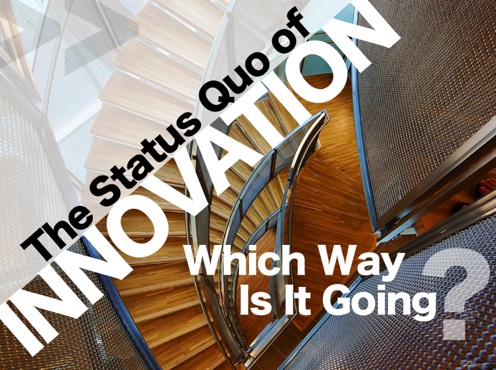 Does innovation have a direction? My point here is, businesses have business plans, they also have marketing plans, sales strategies and R&D plans to name a few. All of these are designed to push a company in a certain direction, hopefully forward and profitable. But what about innovation, which way is it going?
Does innovation have a direction? My point here is, businesses have business plans, they also have marketing plans, sales strategies and R&D plans to name a few. All of these are designed to push a company in a certain direction, hopefully forward and profitable. But what about innovation, which way is it going?
I love the way the brain works to create innovative ideas. For me, that means, I enjoy trying to force myself to think of something really creative and different. I resort to certain tactics that free my brain of the normal grind and open it up to fresh ideas not previously thought of before. I relish those times of creative thinking and pre-innovation if-you-will, and grin from ear to ear when I accomplish an end result that I had not thought of previously.
Sometimes my homemade process works incredibly well, and sometimes it doesn’t. As purposeful and planned as I may be when trying to think about something innovative, occasionally this thinking just has to unfold right in front of me when I don’t expect it. There are unforeseen forces that prevent me from innovating at will and I am unsure what they are. Is it possible the method I am using to stimulate innovative thinking is flawed? If I think about it, it’s a haphazard process that by definition isn’t really a process at all.
Successful Innovators – Creating An Industry Norm
Who would have thought that by creating an industry norm you would have to be an innovator first? The word normal is… well – average.
(noun) the usual, average, or typical state or condition.
Companies that are successful innovators have an unquenchable desire not to be normal and among the status quo. Their people and products emulate that same notion. Normal and average maybe normal and average for the rest of us, but it is not acceptable for these types of companies. They can be so averse to being normal, they focus their energies on creating new products and services that will soon become an industry norm, and change the world as we know it. Funny how that word norm comes into play in this respect.
Discovering A New Way Of Thinking
It’s no surprise that many companies are considered innovation leaders. Apple, Google, Amazon, Tesla, Samsung and GE, to name a few. They somehow figured out how to spot new ideas to discover new ways of thinking. Those new ways are uniquely theirs and have become the mantra and culture of their company.
Apple http://www.apple.com
Amazon http://www.amazon.com
Google http://www.google.com
Samsung https://www.samsung.com/us/
Tesla http://www.teslamotors.com
Do You Have It Or Not?
Does losing the will to innovate mean a person or company never really had it? I know that sounds weird, but how and why can you lose it if you don’t know if you have it or how you got it in the first place? Let’s take this a step further. If there is a status quo among innovators, who gets to define the benchmark for that, and does it always stay in the same place? These are questions that I am not sure anyone can answer, not even the most seasoned CEOs.
Has The Status Quo Has Changed?
I truly believe the quest for successful innovation historically has been random at best. It has also been unpredictable and unrepeatable. I think my own personal attempts to force myself to think of something really creative and different is a perfect example. If there was a status quo of innovation, has it changed? I am not sure how to answer that. However, more and more companies appear to be drawing closer to harnessing the power of innovation and crafting a new business model around their newly discovered innovation. Once they find it, I think the status quo will change forever. However, that doesn’t mean they will have any idea, which way it’s going.
Yourbrandexposed.com is designed to look at digital with an eye into the future with a creative, innovative marketing angle. A digital-business perspective for marketers!
